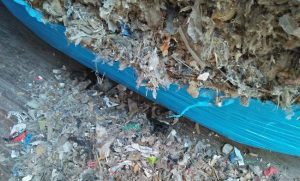On the eve of the new global Plastics Treaty negotiations in Paris, the Australian Environment Minister has decided to reopen plastic waste exports, after a five-year ban introduced by the previous federal government. The 2019 ban on waste exports came in response to China and Southeast Asian countries’ exposé on waste dumping.

Countries that Australia had previously exported plastic waste to, such as Indonesia, Thailand, Malaysia and the Philippines, struggle to manage plastic waste pollution, resulting in significant harm to vulnerable communities and sensitive marine environments.
As scientific evidence grows on the full extent and damage to the planet and human health that plastic waste causes, such regressive decisions from Australia are said to underscore a colonialist approach to waste management policy, where pollution is externalised. The decision highlights decades of failed national plastic waste regulation and a national plastic waste policy in disarray.
“This is no way to fight a plastic pollution crisis,” warned Jane Bremmer, Coordinator of Zero Waste Australia.
“We have already seen the waste export ban exploited by the government and the waste industry. They colluded to create an exemption on exports of bales of mixed plastic waste and paper rebranded as ‘Process Engineered Fuels’. Now we have an admission that plastic waste management is failing in Australia. This is not how you address a plastic waste crisis -we need a cap on plastic production – that’s how you address the plastic waste crisis.”
At the same time the UN has released a report that recommends burning plastic waste in cement kilns, a technology that creates significant pollution that poses health threats to workers and neighboring communities.
Bremmer said: “This is one of the most polluting smokestack industries in the world and incredibly the UN is recommending they increase burning plastic waste. Cement kilns are listed as one of the world’s largest dioxin polluters and plastic wastes contain many toxic chemicals that will add to dioxin emissions. The waste industry is clearly having too much influence on these types of publications and Australian policy.”
Australia’s role and commitment to the UNEA High Ambition Coalition to End Plastic Pollution is questionable, Bremmer commented, as it fails to demonstrate real action on the agreed Global Strategic Goals, choosing instead to export this hazardous waste and invest in false solutions, such as burning plastic waste in cement kilns and investing in controversial technologies such as chemical recycling.
According to Bremmer, Australia has failed to act on reducing the consumption and production of plastic, instead allowing industry to promote recycling as a solution while simultaneously increasing the production of non-recyclable single use plastic.
“Australia must uphold its commitments to the High Ambition Coalition by immediately acting to stop all plastic waste exports and delivering on the agreed Global Strategic Goals. This is hazardous waste as defined in our Australian legislation and should not be exported anywhere. Quietly granting exemptions to waste management facilities to continue exporting this hazardous waste is a slap in the face to all Australians who thought our new federal government cared about the impacts of plastic pollution on our environment both in and outside Australia and the human rights of all peoples,” said Bremmer.
Australia’s plan to re-open plastic waste exports has drawn criticisms from public interest groups in Indonesia, Malaysia, Philippines and Thailand fighting for environmental health and justice.
“We are very disappointed that Australia is reopening waste exports. Malaysia has experienced the impacts of dirty waste trade from Australia, including wastes that were disguised as ‘fuels’. Australia should prioritize source reduction and take responsibility for their own waste. Do not export harm in the pretext of recycling,” stated Mageswari Sangaralingam of the Consumers’ Association of Penang.
“At a time when Thailand is phasing out the imports of plastic scraps and intensifying its regulations on transboundary waste, it is disheartening to see a more developed country moving in the opposite direction. Not to mention, in July last year, 130 tons of municipal waste from Australia was found in a Thai port. To this day, it is unclear if this batch of waste has been repatriated. Plastic exports from Australia have long been a problem for Thailand, and the reopening of plastic waste export policy will only worsen the situation.
“We urge the Australian government to take responsibility for the waste and pollution its country creates, rather than seeking policies that could violate other’s environmental sovereignty and will draw nothing more than condemnation and embarrassment,” added Punyathorn Jeungsmarn, Information and Communication Officer, Ecological Alert and Recovery-Thailand (EARTH).
“This policy is a step backward and should be reversed,” suggested Aileen Lucero, National Coordinator, EcoWaste Coalition. “Instead of exporting its plastic wastes to the Philippines and elsewhere, Australia should put a cap on plastic production and consumption and ensure that unwanted plastics are not incinerated, co-processed in cement kilns or sent offshore in the guise of recycling.”
“Australia’s reversed policy is a bad example of plastic waste governance. Developed countries like Australia should set an example of how to keep a promise,” said Yuyun Ismawati from Nexus3 Foundation.
“Exporting waste for ‘recycling’ or waste to energy to other countries is unsustainable. We’ve witnessed adverse impacts with Australian packaging brands dumped in the communities near paper and plastic recycling factories in Indonesia. In addition, Australian investments in Indonesia to address plastic pollution have made little progress. Australia should clean up its own backyard and increase investment in its own waste management systems instead of exporting and polluting neighboring countries,” Ismawati added.
